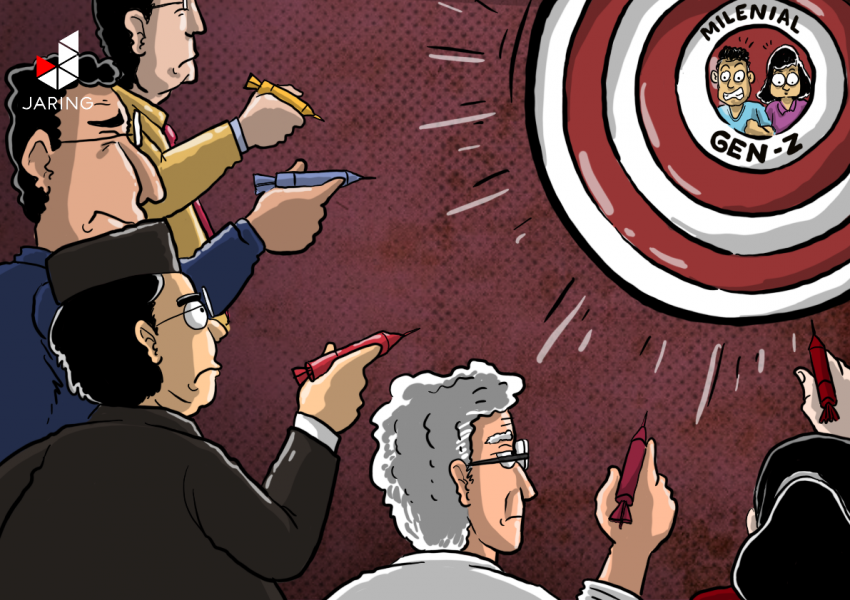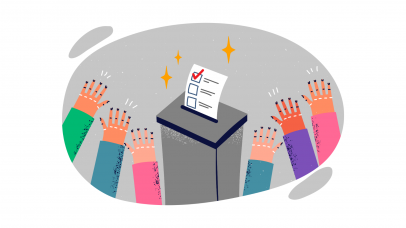
Reading the Youth Vote and Strategies for Facing Challenges in the 2024 Election
?The upcoming 2024 general election is predicted to be dominated by voters in the range of 17-40. the number of young voters estimated can reach more than 100 a million voters Based on data from the General Election Commission (KPU) as of February 2023 it shows that at least 41,716,562 voters aged between 20-40 years have the right to vote. Meanwhile, voters in the age range of 17-30 years reached 62,277,901 people. That's why political parties, election administrators, including the government need to be more responsive to the wishes of young voters.
A leading Jakarta based think-tank, The Center for Strategic and International Studies (CSIS) found a condition related to changes in the political landscape in Indonesia. This is driven by the character of young people who are dynamic and adaptive. Young voters are considered to have more diverse sources of information to choose political contestants, both at the regional and national election levels.
In this way, the responsibility of political parties is to provide names of candidates, both legislature candidates, and presidential candidates who are clean, honest, and have a proven good track record.
According to the results of the CSIS survey, one of the issues concerning young voters is the problem of welfare, employment, and corruption cases. The popularity factor is considered to no longer be a determinant of who can win the 2024 political contest. If these issues are not taken seriously, then the number of abstentions in the 2024 election has the potential to increase.
In 2019, the KPU was considered successful in reducing the abstentions rate to 19.24 percent—the lowest record during the post-reform elections. Even so, General Election Commission (KPU) member August Mellaz admits that he is still worried about the abstentions figure in the 2024 election. The results of the survey on Indonesian Political Indicators in 2021 show that young people have only 32.67 percent of trust in political parties.
"Only 32.67 percent of young people are recorded who have trust in political parties. This is what is worrying, the millennial and Z generations are literate in technology but apathetic to politics," said Mellaz in the Digital Literacy Webteen "Be a Smart Beginner Voter on Saturday (4/1/2023)."
According to Mellaz, the apathy of young people in the 2024 general election has the potential to freeze the political direction in Indonesia. "This change in the leadership cycle is a normal thing. Even junior voters who are currently viewers of this program, where there are two to four election periods in the future will change holding the reins of power in managing the country," he explained.
What Mellaz said was in line with CSIS's findings. Legislative institutions such as the DPD and DPR RI are still looked down upon by young people. Just call it the two institutions that have the lowest level of trust in the eyes of young people, namely the DPD RI with 61.4 percent. Followed by the DPR RI, which had to be satisfied with the figure of 56.5 percent. This is in contrast to the number of people's trust in the TNI. The armed forces, which are now commanded by Admiral Yudo Margono, are the most favored state institution which can rate 93.5 percent.
* The Political Parties have duties to Educate Young Voters
The low interest of young people to join or at least give a feeling of liking for political parties in the survey, basically is a task for election organizers, both the KPU, the Election Supervisory Body (Bawaslu), to the General Election Organizer Ethics Council (DKPP). However, they cannot do it alone. Political parties also need to educate young people.
The results of the CSIS survey in August 2022 showed the support of young people for the current democratic system. Even though the figure has decreased compared to 2018, a democratic political system is believed to be the best procedure for choosing leaders by more than 63% of respondents.
Unfortunately, the civil liberties that were built since the New Order's fall were considered to have suffered a setback. This was influenced by several events, starting from the apparatus' repression of the protesters, the ratification of the Criminal Code, the revision of the Corruption Eradication Commission (KPK) Law, to the massive implementation of the ITE Law which harmed democracy. Later, there was a legal threat to Bimo Yudho, who criticized the Lampung Provincial Government via his TikTok account.
In fact, freedom of speech must be respected by various parties, including the government and political parties.
A number of parties have begun to prepare to target young voters. The Golkar party, for example, has involved its young cadres, both in the party structure and in the government. Dito Ariotedjo is one of the young Golkar cadres who was appointed to the government. By President Jokowi, he was appointed Minister of Youth and Sports.
Deputy General Chairperson of the Golkar Party, Hetifah Sjaifudian did not dismiss the positive impact of the presence of young cadres in Golkar. Apart from breaking the ice, the young cadres have also given fresh air to the political direction of the party with the banyan tree symbol. "One of our policies is to choose the Minister of Youth and Sports from a young cadre, namely Mas Dito Ariotedjo," said Hetifah.
Deputy Chairperson of the PKS Shura Council, Hidayat Nur Wahid, holds the same view. He also encouraged young people to fight for the rules regarding a minimum 30 percent seat allocation for youth in the DPR. Hidayat thinks the proposal is relevant because previously in the 2017 Election Law there was a regulation regarding a 30 percent representation quota for women. "We encourage young people to fight for representation seats of at least 30 percent. Because before that there was already 30 percent for women and later we can push for representation for other groups or communities," he said.
A number of collective movements of young people began to grow up. Take Think Policy Indonesia for example— an organization working on public policy issues, with What Is Up, Indonesia? (WIUI - Indonesian social and political independent media for international youth) in collaboration to develop a wise movement in choosing.
"We will not just stop at the launch activities, after this, there will be a series of activation activities held in other cities which will start from April to December 2023. The aim of this series of activities is an independent effort to reach out to young people more broadly. So that later more young people can exercise their right to vote wisely in the 2024 general election," said Think Policy Indonesia Founder and CEO, Andhyta Firselly Utami. []
Author: Irfan Al Amin




